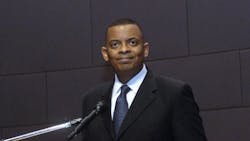Foxx DOT nomination wins wide praise in transportation circles
The nomination of Charlotte NC Mayor Anthony Foxx by President Obama to be the next U.S. Secretary of Transportation is initially garnering praise from all sides of the transportation industry.
On Capitol Hill, Bill Shuster (R-PA), chairman of the House of Representatives committee on Transportation and Infrastructure, stressed that he’s “pleased” President Obama nominated Foxx to be the next U.S. Transportation Secretary.
“Transportation is important for our country,” Shuster said. “These issues are about jobs, quality of life, and prosperity. I remain committed to building consensus about how to strengthen our infrastructure, promote economic growth, and make the nation more competitive in the global marketplace. Once he has been confirmed by the Senate, I look forward to working with Mayor Foxx to achieve these goals for our country.”
Bud Wright, executive director for the American Association of State Highway and Transportation Officials (AASHTO) also stressed that he “looks forward” to working with Mayor Foxx on what Wright called “the important transportation issues facing the nation and on identifying a long-term sustainable transportation funding sources.”
Michael Nutter, mayor of Philadelphia and chairman of the U.S. Conference of Mayors (USCM), highlighted Foxx’s “practicality” when it comes to managing complex transportation issues.
“Like all mayors, [Foxx] is pragmatic and knows what it takes to get things done,” Nutter said. “As an executive, Mayor Foxx is keenly aware of the connection between transportation investment, economic growth and job creation, and he understands how critical transportation investment is to cities and metropolitan areas in fueling economic growth and recovery.”
Elected to serve on the USCM’s advisory board, then appointed as co-chair of the USCM Small Business and Franchising Task Force before serving as chair of the USCM’s Advanced Manufacturing Task Force, as well as a member of the new Infrastructure Financing for Cities Task Force, Foxx is in Nutter's opinion a “natural leader” who quickly made his mark.
"One example of his [Foxx's] leadership is his strong advocacy for his 2030 Transit Corridor System Plan, a growth stimulating investment in his region's public transportation network that includes 25 miles of commuter rail, 21 miles of light rail, 16 miles of streetcar, 14 miles of bus rapid transit, and an expanded network of buses and other transit services,” Nutter noted.
Bill Graves, CEO of the American Trucking Assns. (ATA), noted that as mayor of a large city, Foxx dealt with “very similar challenges with regard to transportation issues that I did when I was governor” of Kansas, chiefly responding to the demands of constituents and developing a multimodal transportation network.
“As someone who can appreciate how hard it can be to actually do that, I wish Mayor Foxx luck and I look forward to working with him to ensure that Americans have the first-rate, world-class transportation system they deserve,” Graves added.
Edward Wytkind, president of the Transportation Trades Department for the AFL-CIO, also showered Foxx with praise, too – while also using his congratulatory statement to push the union’s position on transportation funding objectives.
“Mayor Foxx is assuming a critical job during a critical time as our transportation system is suffering from underinvestment due to Washington’s obsession with austerity,” Wytkind said.
“We need leadership from this Administration on how to fund the nation’s long-term, multi-modal transportation operating and infrastructure needs,” he added. “Report after report concludes that a lack of new investments in transportation is harming our economy and competitiveness, and slowing job creation. I look forward to discussing with Mayor Foxx the nation’s mounting transportation challenges, many of which he has experienced first-hand as the Mayor of Charlotte.”
About the Author
Fleet Owner Staff
Our Editorial Team
Kevin Jones, Editorial Director, Commercial Vehicle Group
Cristina Commendatore, Executive Editor
Scott Achelpohl, Managing Editor
Josh Fisher, Senior Editor
Catharine Conway, Digital Editor
Eric Van Egeren, Art Director
